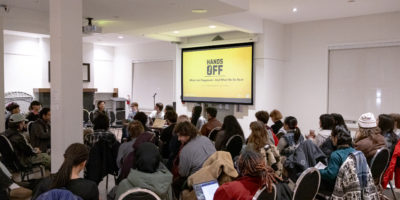By Premila D’Sa
Every semester, the Ryerson Image Centre (RIC) puts on compelling, contemporary and sometime shocking exhibitions. And while the RIC is right in the middle of campus, with bigger-than-life displays of some of their work, for students not involved in photography it’s mostly just become a place to stop for a smoke or a snack.
But there’s a lot that goes into the centre. Co-curator Paul Roth said many exhibitions are planned years in advance. The Eye sat down with Roth, who’s been in the position since 2013, to discuss the process of curating exhibits at the centre and the tragic but compelling work in store for this season.
Roth said the curation process usually begins around one body of work. This year, he said, the gallery knew they wanted to showcase Gordon Park’s The Flavio Story, a series of photographs that juxtapose the life of Flavio, a poor 12-year-old, against the people of the wealthy enclave he lived beside.
“One of the things that really intrigued us was the idea of the role of photography in helping people understand trauma or traumatic events. So that’s kind of where we started,” said Roth. When the exhibit first displayed, it elicited a series of generous actions from audiences. Flavio, the subject, received thousands of letters and almost $30,000 according the RIC’s website.
Roth said from that point, the museum’s collections curator Denise Birkhofer brought up looking further into artists from Central and South America. She was particularly interested in the Mexico City earthquake of 1985, said Roth, an event that went on to effect the socio-political affairs of the nation for years. The RIC’s second show is called Terremoto, a collection of photos documenting the city after the earthquake. The centre stayed in South America for their third exhibition, a series of photos by Bolivian artist Claudia Joskowicz, of every building on a street that was the site of constant violent protests in Bolivia.
The RIC’s last exhibit takes it in a different direction. It’s called The Sisters Project, a collection of portraits by Ryerson alumni Alia Youssef, documenting Muslim women. Roth said even though the work is modern, Youssef’s exhibit is historical considering its work was made in the context of a Trump presidency, where Muslim identity has been weaponized against these women.
“The moment that they were photographed, they are like ghosts in the universe that just continue to recur and continue to haunt the present day,” said Roth.
While the RIC is a hub for photography in the city, the centre’s main audience, and the one they care about the most, has always been students. Roth said he hopes more of them will drop by.
All four exhibitions will be at the RIC for free from Sept. 12 to Dec. 9.













Leave a Reply